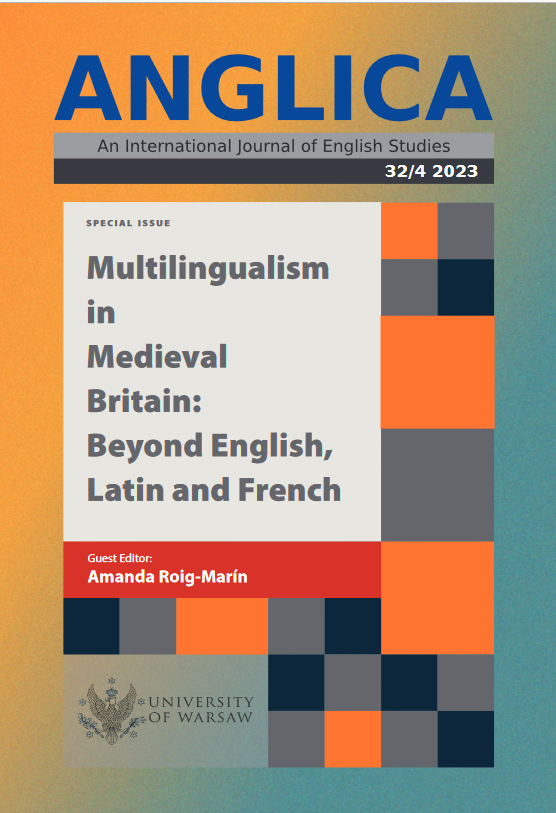Numer 32 (4/2023)
Multilingualism in Medieval Britain: Beyond English, Latin and French|
Spis treści
Strony
Pobierz
|
|||||
|
Amanda Roig-Marín
Introduction: Reassessing Multilingualism in Medieval Britain
DOI: 10.7311/0860-5734.32.4.01
5 – 22
|
|||||
|
|
|||||
|
|
|||||
|
Słowa kluczowe Reformation |Anglo-German language contact |Early English |lexical borrowing |botany |mineralogy |mining |ChristianisationStreszczenie The paper outlines the contribution of German to the word stock of English in the three periods of Old English, Middle English, and Early Modern English, or, in other words, from the early Middle Ages up to 1700, and relates these words to major cultural events, such as the Christianisation of England, the Norman Invasion, the Reformation and to the beginnings of science and technology during the Renaissance. Methodologically, the term German will be used in the sense of High German and its antecedents rather than Low German or Low Dutch. As a consequence of this approach, the impact of German on the English language during these periods is rather small in terms of numbers, but interesting and varied as far as domains of borrowing, transmission routes of words, linguistic strategies (i.e. importation v. substitution), and mode of transmission (i.e. written v. spoken) are concerned. INFORMACJE O AUTORZE |
|||||
|
|
|||||
|
Słowa kluczowe etymology |Scots |Arabic |Dictionaries of the Scots Language |Oxford English DictionaryStreszczenie Detailed study of individual lexemes can open up interesting angles on the cultural underpinnings needed for the understanding of linguistic history. This paper surveys that element of Scots vocabulary that has been flagged as derived, even if at several removes, from Arabic. To do so, it draws primarily on the materials supplied by the Dictionaries of the Scots Language and the Oxford English Dictionary, supplemented by wider contextual analysis. |
|||||
|
Eleni Ponirakis
Hellenic Language and Thought in Pre-Conquest England
DOI: 10.7311/0860-5734.32.4.04
61 – 82
|
|||||
|
Słowa kluczowe Greek |Maximus the Confessor |Theodore of Tarsus |Pseudo-Dionysius |Lateran CouncilStreszczenie Bede, reflecting on the success of the Canterbury school set up by Theodore of Tarsus remarked: “some of their students still alive today are as proficient in Latin and Greek as in their native tongue” [trans. Colgrave and Mynors 1969, 335]. By the time we get to the court of Alfred two hundred years later, there had been a famous decline in learning from which Greek, as a language, had not yet recovered. However, there remained a strong interest in Greek as a sacred language in liturgies, prayers and magical charms, and later in hermeneutic poetry. Theodore’s influence was not limited to Greek Language, he also brought knowledge of Maximus the Confessor and Pseudo-Dionysius. The influence of Greek mystical theology would find fuller expression in the translations associated with the court of King Alfred via contact with the Carolingian court, but the seeds for this reception in England may already have been sown. This paper will outline the evidence for the use of Greek language in a variety of contexts, including a charm for the staunching of blood, and it will examine the extent of the influence of Greek patristic thinking in Old English texts including both clerical prose and secular poetry. |
|||||
|
Jordi Sánchez-Martí
The Advent of the Printing Press and Britain’s Multilingual Textual Culture, 1471–1510
DOI: 10.7311/0860-5734.32.4.05
83 – 107
|
|||||
|
Słowa kluczowe Middle English |printing history |Old Scots |William Caxton |Wynkyn de Worde |Andrew Chepman |Andrew MyllarStreszczenie This article discusses the effects the new technology of printing had on the rich and multilingual textual culture of late medieval Britain. Before setting up his press in Westminster, William Caxton had books published in Latin, French and English. As soon as he relocated to England, however, he abandoned this multilingual business model and devoted all his energies to print books in English, as did his successors Richard Pynson and Wynkyn de Worde. Not only did they favour English over all other British languages, but promoted a London-based variety of English at the expense of other dialects. Hence, before giving to the press the Scots Contemplacioun of Synnaris by William Touris, Wynkyn de Worde chose to have it Anglicized. When Walter Chepman and Andrew Myllar established a printing press in Edinburgh in 1508, they replicated the choices of their English counterparts, promoting the standard form of Scots and even Scotticizing Middle English texts, such as Sir Eglamour of Artois. I conclude by arguing that the introduction of the printing press in Britain enhanced the prestige of the language variety used by the elite and became instrumental in eroding the balances existing in the British language ecosystem. |
|||||

